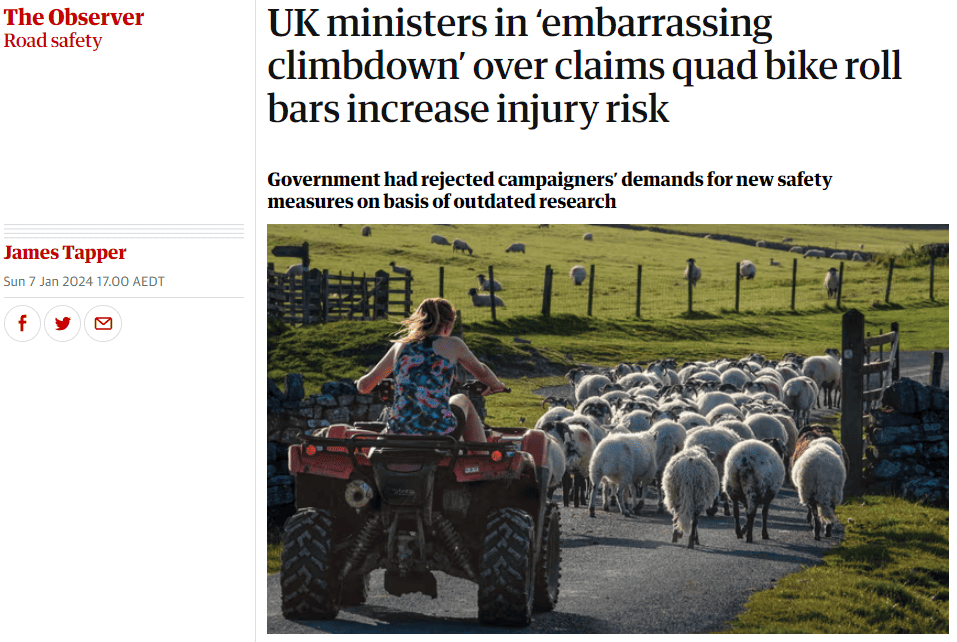Below is a video of a worker setting up their work area and dusting a retail sign. When one sees such videos or images, we naturally think, “What is he doing?” and “What was he thinking?” This article speculates on those questions and what could have been done.
Category: media
Quad Bike safety? It’s the UK’s turn
A recent article in The Observer illustrates just how far behind Australia the United Kingdom is on requiring the installation of crush protection devices on quad bikes. It is also surprising that the UK’s Health and Safety Executive (HSE) is not just relying on independent Australian research into quad bike rollovers. The vehicles are the same makes and models, the terrain is similar, and the risk is the same …??
Engineered stone in the business media
The Australian Financial Review (AFR) is a newspaper written for and about business, so worker safety and health is usually depicted as a nuisance to be addressed only when one absolutely must. However, its coverage of engineered stone products is notably skewed.
The normalisation of quad bike safety
Segway has made a push into the Australian quad bike market, helping to fill the gap left by some vehicle manufacturers who would not accept safety improvements to their quad bikes. Prominent Australian agricultural newspaper, The Weekly Times, reviewed the latest Segway quad bike models. Rider safety was not mentioned specifically in the review, but it was visibly present in the accompanying image and reinforced by Segway’s video media relelase.
Can we laugh at workplace health and safety?
Occupational health and safety (OHS) has never had a profile as high as that of the environmental protection movement. OHS has never had a single, focused advocate like Greenpeace to make it visible. OHS activists do not hang banners off Tower Bridge or throw eggs at politicians (yet). One of the characteristics shared by OHS and environmentalists is the lack of comedy. An existential crisis like climate change is hard to laugh about, just as workers are dying, but some would argue that such black comedy could be productive and promotional. A recent show on the BBC World Service, The Climate Question, looked at environmental humour, but there are OHS parallels.
Continue reading “Can we laugh at workplace health and safety?”Should photos of unsafe activities be published unedited?
In early December 2023, the Australian Financial Review (AFR) published this (unblurred) photo of a woman, a man, and a child riding a single motorbike in the Australian countryside. Riding in such a way is unsafe, some may say reckless, and contrary to the operational guidelines of motorcycle manufacturers. Should the AFR have used this photo? Should there be a ban on such photos?
Initial reflections on the 23rd World OSH Congress
The 23rd World Congress on Safety and Health at Work has been a remarkable achievement, with 3000 delegates, at least two-thirds of whom are from outside of Australia. The most valuable elements of this Congress have been the opportunities to network, talk to people you’ve never met, and get new perspectives. What has been a little peculiar was the presentations or, rather, the format of the sessions.







